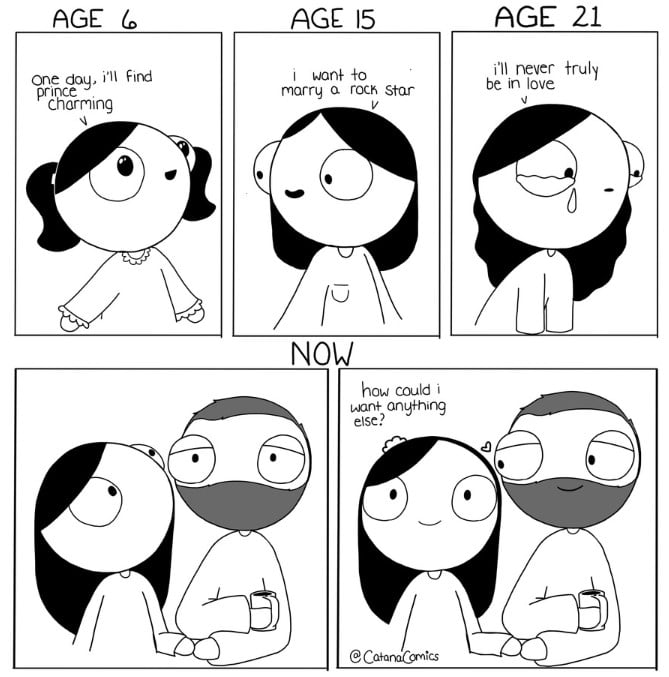
The image above is so true in so many ways. When we are young we often have rather mistaken ideas of love. When we are very young, in this country, our ideas of love are drawn from our parents and from the stories we hear. Yes, that is indeed the Prince Charming stage of our thinking about love. We will either rescue the prince/princess, or we will be rescued by the prince/princess.
As we grow older, our ideas of love may grow, but often they are still a tad unrealistic. We may not think of a Prince Charming, but sometime we think of a rock star, or other high and mighty person. This is not merely a modern phenomenon, it is an accurate appraisal of what we are like in early adolescence. The story of Romeo and Juliet is a classic story of a pair of teenagers infatuated, one with the other. Sadly, those infatuations often are unbalanced, and can lead to unpleasant results.
But, did you know that one can also find romantic love in the Bible? I need to say that because there is a set of supposedly Christian teachings making the rounds that almost make it appear that marriages should be arranged and that romantic love is fully untrustworthy. Yes, sadly, much of what passes for romantic love is untrustworthy, but not all of it, and not necessesarily.
One of the earliest romantic stories is found in Genesis. In Genesis 29, it says:
While he was still talking with them, Rachel came with her father’s sheep, for she was a shepherd. When Jacob saw Rachel daughter of his uncle Laban, and Laban’s sheep, he went over and rolled the stone away from the mouth of the well and watered his uncle’s sheep. Then Jacob kissed Rachel and began to weep aloud. He had told Rachel that he was a relative of her father and a son of Rebekah. So she ran and told her father. …
Genesis 29
Jacob was in love with Rachel and said, “I’ll work for you seven years in return for your younger daughter Rachel.”
Jacob worked seven years for Rachel, but was fooled by his Uncle Laban on his wedding night, when he slipped in his older daughter, Leah, for Rachel. So, he worked an additional seven years so that he could marry Rachel. They were in love for the rest of their lives. Jacob made some bad decisions, but his love for Rachel was unending. Sadly, Leah was the victim of her father’s evil machinations. However, the Lord gave her some recompense. One of her sons was Judah, from whom Our Lord is descended, and from whom the word “Jew” is descended. Thus, her father’s machinations led to her being one of the great-great-great-etc-grandmothers of Jesus.
The Song of Songs is often interpreted in any way but a romantic way. While it does have a true and allegorical interpretation, it also has a more historical one. And that interpretation is of a tale of great and wonderful romantic love written at the time of the great King Solomon. It begins,
Let him kiss me with the kisses of his mouth—
Song of Songs 1:2-4
for your love is more delightful than wine.
Pleasing is the fragrance of your perfumes;
your name is like perfume poured out.
No wonder the young women love you!
Take me away with you—let us hurry!
Let the king bring me into his chambers.
While the Scriptures do not major in romantic love, nevertheless, they do support romantic love. It is not the love that is a problem. It is the unfortunate and inappropriate behavior that can follow and that requires the exercise of self-control to prevent misbehavior and sin. I am very much against those interpretations of the Scriptures that equate romantic love to inappropriate passion. The Scriptures never do that. The two are separate, although they may appear to be linked. There is romantic love and there is inappropriate passion, the two are separate. (For those of you who have read St. Maximus the Confessor, inappropriate passion would be part of our gnomic will.)
As we spiritually mature, we strive toward that love pictured in 1 Corinthians 15. But, I am a strong believer that those of us who are married should never lose our romantic love for our partner anymore than Jacob ever lost his love for Rachel. We add to it the maturity that comes with experience, the maturity that comes from the Spirit of God. But, we should not lose our romantic love for our partner.
Finally, with our partner, we end up wondering how we could have wanted anything else other than the love we have for them. It is at that point that the Sacrament of Marriage has had its full effect. When we know that we could have never wanted anything else, we understand finally what it is to know the love of God. Should it be, then, any surprise that the Song of Songs is interpreted allegorically as a picture of the love between God and His Church?



Leave a Reply